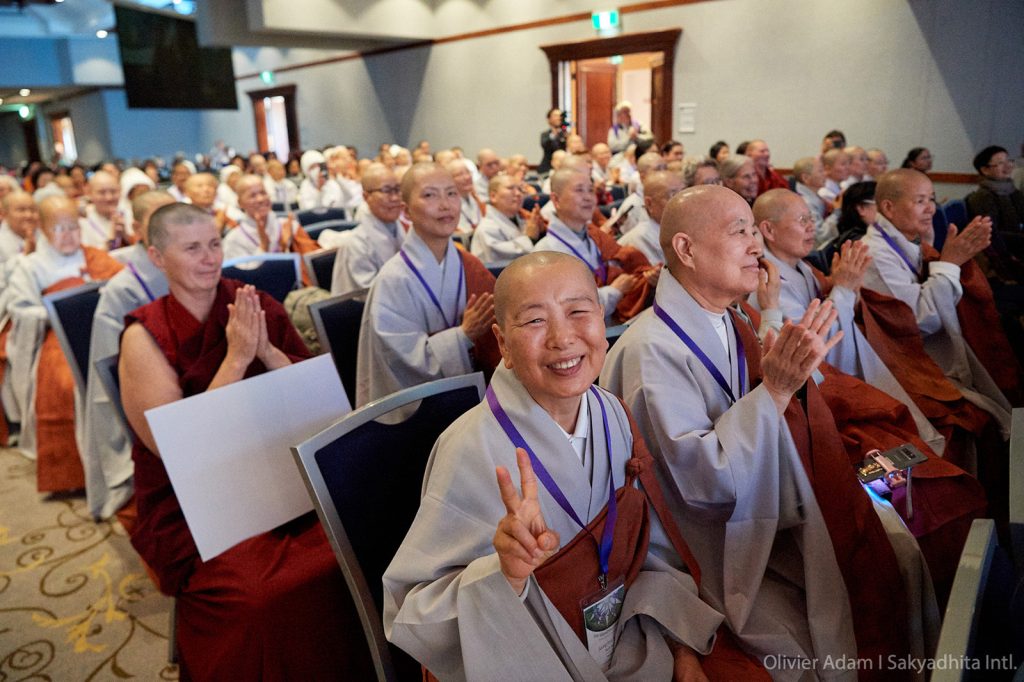The Sakyadhita International Association of Buddhist Women hosted its 16th conference in late June, gathering over 800 Buddhist nuns and laywomen from 29 countries in the city of Blue Mountains, Australia—returning for the first time since the #MeToo movement started making headlines and marking the first time the event was held outside Asia.
Since its inception in 1987, Sakyadhita has pushed against the injustices affecting lay and ordained women from around the world, organizing biennial summits where women and men from diverse Buddhist traditions meet to present papers, dharma talks, workshops, meditation and chanting sessions, and roundtable discussions.
In the past, Sakyadhita has hosted its conferences in Asia (the previous four took place in Hong Kong, Indonesia, India, and Thailand). This was partly intended to ensure that the meetings were accessible to as many nuns and laywomen as possible—the majority of whom live in Asian countries.
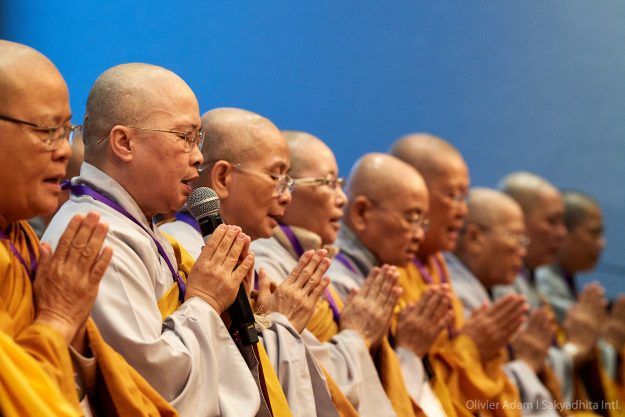
But this year the Buddhist women’s organization had a unique opportunity to hold a gathering in a region with a less-established Buddhist history. Fittingly, the theme of the conference was “New Horizons in Buddhism.”
“I think the idea [behind the theme] was that the Australian venue would encourage new directions for discussion,” Ven. Karma Lekshe Tsomo told Tricycle. Ven. Lekshe is one of the founders of Sakyadhita and was a central organizer of the conference from its start through the last meeting in the summer of 2017. (That fall #MeToo would start trending on Twitter.)
“The issue of sexual misconduct [in Buddhist communities and institutions] was raised very openly, for example. . . We could openly recognize that women have spiritual friends they can talk with about these problems,” she added.
As in previous conferences, presentations reflected the major concerns and obstacles that female monastics and laywomen face in the present era.
Two Australian women also spoke about their experiences as members of Rigpa, the spiritual community founded by disgraced Tibetan Buddhist teacher Sogyal Rinpoche, who has been accused of physically and sexually abusing his followers. An independent investigation later confirmed many of the abuse allegations against him.
Artist and former nun Damcho Dyson spoke frankly about the physical violence she endured at the hands of Sogyal, and editor and author Tahlia Newland spoke on her decision to found Beyond the Temple (formerly What Now), a blog and forum for former Rigpa students that provided a space to process their experiences.
“Like many others, I met Sogyal at a time when I was yearning for a way to make sense of suffering, after my life was derailed by a series of traumas,” Dyson shared. “I didn’t want to fall back into the confusion and suffering of my life, and so I reasoned that I should surrender my ego to the teacher and follow him and the lineage of the Buddha’s teachings.”
Read Dyson’s full speech and Newland’s account here.
The speakers’ unyielding honesty left a palpable impression, attendees said.
“The whole room stood still,” American Zen Buddhist priest Roshi Joan Halifax, who gave a talk on hope and socially engaged Buddhism, told Tricycle. “An equanimity and carefulness undergirded Damcho’s presentation. This wasn’t a person standing up who’s morally outraged. This was a person who had done careful work on issues related to the extreme power imbalances and the kind of cult-like behavior of this particular community.”
Ven. Dr. Tenzin Dadon of Bhutan and Ven. Dr. Karma Tashi Chodron of Malaysia, two nuns in the Tibetan Buddhist tradition, gave a groundbreaking presentation on the sexual abuse of Buddhist nuns in Bhutan. Tenzin Dadon holds an M.A. in Buddhist Studies and a PhD in Religion and Gender, and has participated in eight Sakyadhita conferences, as a presenter, translator, and moderator. Karma Tashi Chodron has a PhD in Environment and Resource Studies, and works extensively as a conservationist.
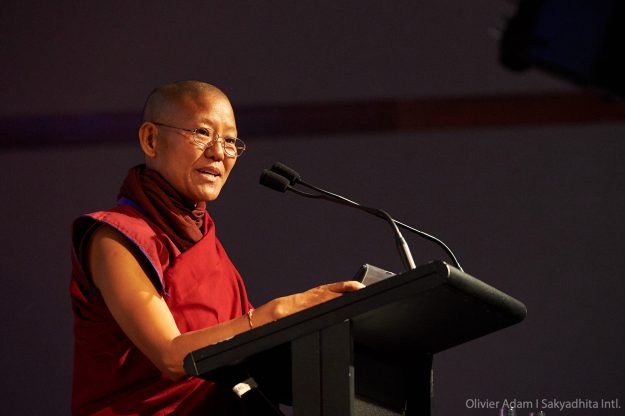
Halifax hailed their lecture—entitled “Silent No More! Critical Review of Sexual Exploitation in Buddhist Practice: A Monastic Perspective”—as “uncompromising and brilliant.”
“They delivered their presentation in an extremely intelligent, highly equanimous way. I was shocked—but also informed. One sort of imagines that this is happening, but it is not talked about,” she recalled.
Other speakers and workshop leaders included Buddhist teacher and translator Sarah Harding, environmental researcher and conservationist Dekila Chungyalpa, and nuns’ ordination advocate Bhikshuni Thubten Chodron. Ven. Jeong Kwan, whose vegetarian temple cooking was featured on the Netflix series “Chef’s Table,” taught a workshop on kimchi making.
And Jetsunma Tenzin Palmo, the current president of Sakyadhita International, celebrated her 76th birthday.
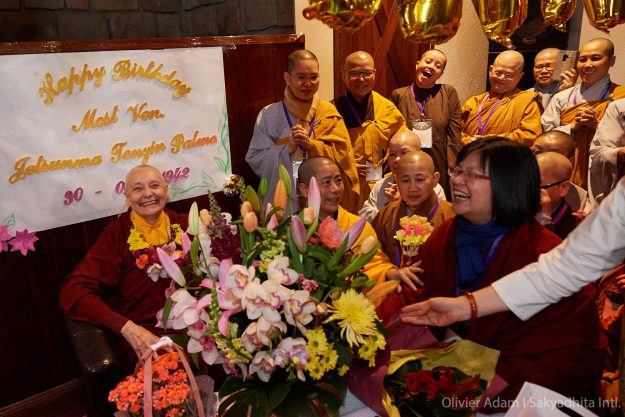
With 32 years of conferences behind her, Ven. Lekshe reflected on her role in the formation and achievements of Sakyadhita and the organization’s humble beginnings.
“We had no grand hopes or dreams. We simply wanted to create a safe and welcoming space for women from different traditions,” she said.
The first conference was held in Bodh Gaya, India (the site of the Buddha’s enlightenment), in 1987. The organizers initially thought the conference would be a small gathering of nuns, but the meeting ballooned into a summit, attended by His Holiness the 14th Dalai Lama. “We broke through many boundaries at that first conference. Imagine monks sitting at tables the same height as the nuns! But with His Holiness the Dalai Lama sitting right there with his gleaming smile of encouragement, no one dared to refuse,” Ven. Lekshe remembers.
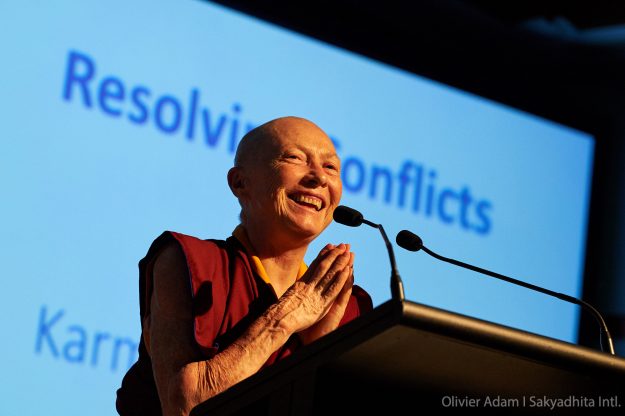
“[At this last conference] in Australia, I met Bhikshuni Karma Dechen, one of the four nuns who helped me manage that first conference. We laughed when we recalled all the many difficulties we encountered and how we just blasted through them all. There are times for caution and other times for daring. We felt a bit proud that we were foolish enough and courageous enough to take on such a huge, unprecedented, unpredictable task!”
One of the most dynamic effects of Sakyadhita has been the development of strong alliances and friendships between nuns, scholars, activists, and artists of different Buddhist traditions and backgrounds. The conferences give women access to more information about the Buddhist world beyond their centers or monasteries, a chance to bear witness to the accomplishments of other women, and the opportunity to learn from and appreciate other traditions.
“Not once did I feel the kind of sectarian competition that often comes in an interfaith meeting. People were really curious about how and what other traditions practice, what their aspirations were,” Halifax observed.
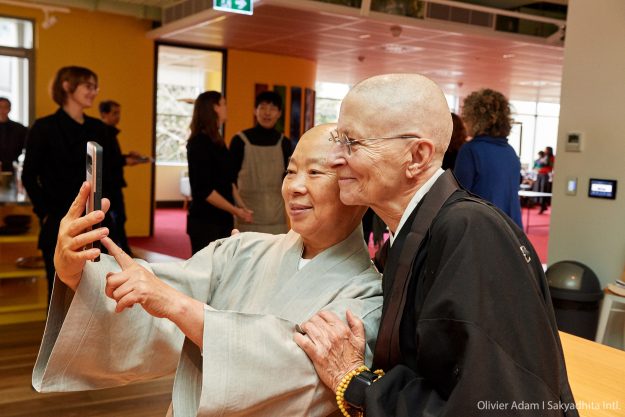
“At one point I turned around and looked back at who was sitting behind me to see almost a 1,000 women (and a few men). Most of the women had shaved heads and were wearing robes—grey, brown, orange, white, pink—it was staggering. You know, I’d never been in the same room with so many women practitioners. It was like being in this sea of Guan Yin’s [the bodhisattva of compassion who is often depicted as a woman].
“It was a truly amazing conference, if one can call it that. More like a happening! The whole thing was beyond my wildest expectations and imaginings.”
The next Sakyadhita conference will be held in Sarawak (Borneo), East Malaysia, in 2021.
Thank you for subscribing to Tricycle! As a nonprofit, we depend on readers like you to keep Buddhist teachings and practices widely available.
